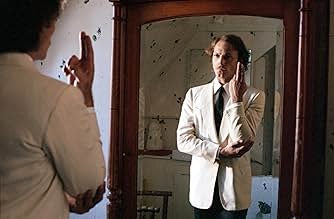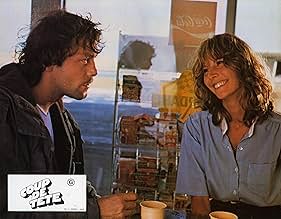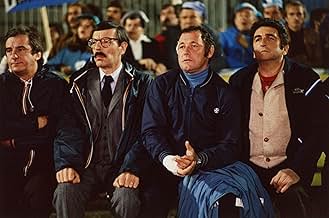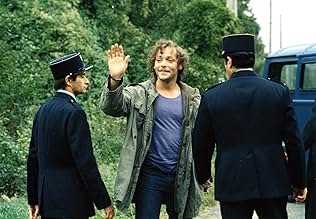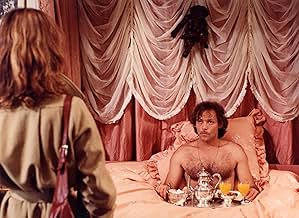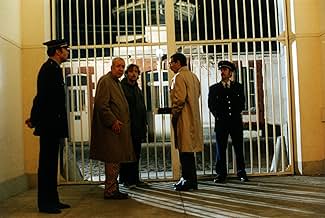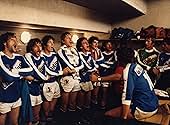CALIFICACIÓN DE IMDb
7.2/10
2.4 k
TU CALIFICACIÓN
Un futbolista aprovecha su recién adquirida fama para vengarse de otro jugador.Un futbolista aprovecha su recién adquirida fama para vengarse de otro jugador.Un futbolista aprovecha su recién adquirida fama para vengarse de otro jugador.
- Dirección
- Guionistas
- Elenco
- Premios
- 1 premio ganado y 1 nominación en total
- Dirección
- Guionistas
- Todo el elenco y el equipo
- Producción, taquilla y más en IMDbPro
Opiniones destacadas
Warning: The following text may is written in horrible English. Sorry. The movie is about a talented food-ballplayer, who is thrown out of the 2nd Team cause he wounded the Starplayer of the first team in a training-game. Cause the coach is also the boss of the factory he's working in, he gets fired soon. More problems are coming. Then police sent him innocently in prison. He raped a woman, they say. Then, when his old team needs a player they take him out of prison. He runs away to find out the reasons for all this. After understanding everything he plays THEIR game, just waiting for his revenge... To be honest till now I have seen only 4 movies by Patrick Dewaere... But again I have to say that he is my favorite french actor and this movie is not only critically it's also extremely funny. I hope i will see more movies of him, because sadly ,in general German television prefers to show superficial movies. So WATCH IT. If you have already seen it.. DO IT AGAIN..
Francis Veber hasn't only written and directed for himself, he has also penned scenarios for the others. Thus, he well served Edouard Molinaro for "l'Emmerdeur" (1972), Pierre Granier-Deferre with "Adieu Poulet" (1975) and Jean-Jacques Annaud with this "Coup De Tête". Shot before more ambitious plans would come to his mind ("le Nom De la Rose", 1986 or "l'Ours", 1988), this film ferociously demystifies football and as it's a very popular game in France, it was a refreshing, necessary gesture even if the film didn't do very well at the French box-office for evident reasons: it lingered on the other side of the picture.
From the outset with the choice of the scenery (the film was shot in Auxerre, a famous town for its football team) the first steps of the plot and the role of the characters, the authors' intentions are clear: to seal an alliance between entertainment and onslaught. This is what underpins the film. Through François Perrin's (Patrick Deweare) fall and rise, Annaud and Veber vent their spleens on the unscrupulous leaders of the football club and the shameless actions or schemings they adopt to preserve their interests or their players'. Violence, bribery, blackmail and the manipulative power they exert towards the players, the supporters even the population make the object of a specific, eloquent demonstration to amount to a simple, efficient denunciation. And when Stéphanie reveals what lies beneath the false rape accusation that hangs over Perrin, the attack is doubly intense. The plot deftly incorporates these doubtful actions and is helped by a laid-back Patrick Deweare who brews revenge in his glory hour. Perhaps Veber and Annaud should have more insisted on his bad temper.
Another tawdry aspect of football will be explored by Jean-Pierre Mocky in his "a Mort l'Arbitre!" (1984): blind fanaticism that can grab rabid supporters and lead them to murder.
From the outset with the choice of the scenery (the film was shot in Auxerre, a famous town for its football team) the first steps of the plot and the role of the characters, the authors' intentions are clear: to seal an alliance between entertainment and onslaught. This is what underpins the film. Through François Perrin's (Patrick Deweare) fall and rise, Annaud and Veber vent their spleens on the unscrupulous leaders of the football club and the shameless actions or schemings they adopt to preserve their interests or their players'. Violence, bribery, blackmail and the manipulative power they exert towards the players, the supporters even the population make the object of a specific, eloquent demonstration to amount to a simple, efficient denunciation. And when Stéphanie reveals what lies beneath the false rape accusation that hangs over Perrin, the attack is doubly intense. The plot deftly incorporates these doubtful actions and is helped by a laid-back Patrick Deweare who brews revenge in his glory hour. Perhaps Veber and Annaud should have more insisted on his bad temper.
Another tawdry aspect of football will be explored by Jean-Pierre Mocky in his "a Mort l'Arbitre!" (1984): blind fanaticism that can grab rabid supporters and lead them to murder.
François Perrin is a talented footballer who also has a talent for not going along to get along. In the small fictional town of Trincamp, the bourgeois factory owner and the petit-bourgeois shop owners are all obsessed with the local football club's success. Irresistible force meets immovable object and conflict ensues: that's basically the plot of Coup de tête, which can mean 'header' in football or a 'headbutt' in a fight. Perrin falls out (literally) with the club's loutish star player and is framed for a rape he did not commit. After being imprisoned on the basis of false testimony, Perrin is released to save the day in a big match, which qualifies the team for the finals and sets up his getting even with the townspeople.
The examination of the group of powerful men (as they all are here) who run the town and the football club is perceptive and unusual to see in a film. The sexual politics was perhaps even in its day a bit more problematic. The assault for which Perrin is imprisoned is not shown on screen, but we are set up to believe him capable of it by a slapstick assault on his girlfriend on a scaffold. Later Perrin breaks in to the assault victim's bedroom and pretends to rape her since he's already been convicted of the crime. When he relents she is overcome by his charm and a sense of the injustice done to him to join forces with him.
Perrin has his revenge in the end, but we're also left wondering whether everyone who called him a salaud didn't also have a point.
The examination of the group of powerful men (as they all are here) who run the town and the football club is perceptive and unusual to see in a film. The sexual politics was perhaps even in its day a bit more problematic. The assault for which Perrin is imprisoned is not shown on screen, but we are set up to believe him capable of it by a slapstick assault on his girlfriend on a scaffold. Later Perrin breaks in to the assault victim's bedroom and pretends to rape her since he's already been convicted of the crime. When he relents she is overcome by his charm and a sense of the injustice done to him to join forces with him.
Perrin has his revenge in the end, but we're also left wondering whether everyone who called him a salaud didn't also have a point.
A wonderful and little-known film, starring the late, great Patrick DaWaere as a hot-headed young man who works in a French factory town where the town's morale is intimately linked to the football (i.e. soccer) team. To be on the team and work in the factory are all there is in this town.
When the star of the team commits a crime, the town's most powerful citizens decide that someone else must take the blame, because they can't afford to lose the culprit from the team... it would be bad for business. So they scapegoat the hot-head, instead. But he returns to wreak his revenge... or rather, to outwit the guilty into wreaking revenge on themselves for him.
An unusual film for Annaud, a typically brilliant piece of scripting by Veber, and a thoroughly engaging performance by DaWaere as the wronged man. Whatever happened to this movie?
When the star of the team commits a crime, the town's most powerful citizens decide that someone else must take the blame, because they can't afford to lose the culprit from the team... it would be bad for business. So they scapegoat the hot-head, instead. But he returns to wreak his revenge... or rather, to outwit the guilty into wreaking revenge on themselves for him.
An unusual film for Annaud, a typically brilliant piece of scripting by Veber, and a thoroughly engaging performance by DaWaere as the wronged man. Whatever happened to this movie?
One of the best, most enjoyable little films I've ever seen. It's remarkable that it isn't more celebrated, especially considering the director and the actor involved. A must see, if you can figure out a way to see it.
¿Sabías que…?
- Versiones alternativasIn Spain the movie was dubbed twice. First on its theatrical release in 1982, and again in 2013 when it was release for the first time on DVD. The 1982 dubbing can only be found on the 80s VHS.
- ConexionesFeatured in Francis Veber artisan du rire: La mécanique dure rire (2002)
Selecciones populares
Inicia sesión para calificar y agrega a la lista de videos para obtener recomendaciones personalizadas
- How long is Hothead?Con tecnología de Alexa
Detalles
- Fecha de lanzamiento
- País de origen
- Idiomas
- También se conoce como
- Hothead
- Locaciones de filmación
- Rue du Château, Paris 14, París, Francia(café at corner with Rue de l'Ouest, area now redeveloped)
- Productoras
- Ver más créditos de la compañía en IMDbPro
- Tiempo de ejecución
- 1h 29min(89 min)
- Mezcla de sonido
- Relación de aspecto
- 1.66 : 1
Contribuir a esta página
Sugiere una edición o agrega el contenido que falta

![Ver Bande-annonce [OV]](https://m.media-amazon.com/images/M/MV5BMjQwMzMyMTgtZjMzYS00YTMwLWI4OTItOTRiNzlkYWUxNGI0XkEyXkFqcGdeQXRyYW5zY29kZS13b3JrZmxvdw@@._V1_QL75_UX500_CR0)
